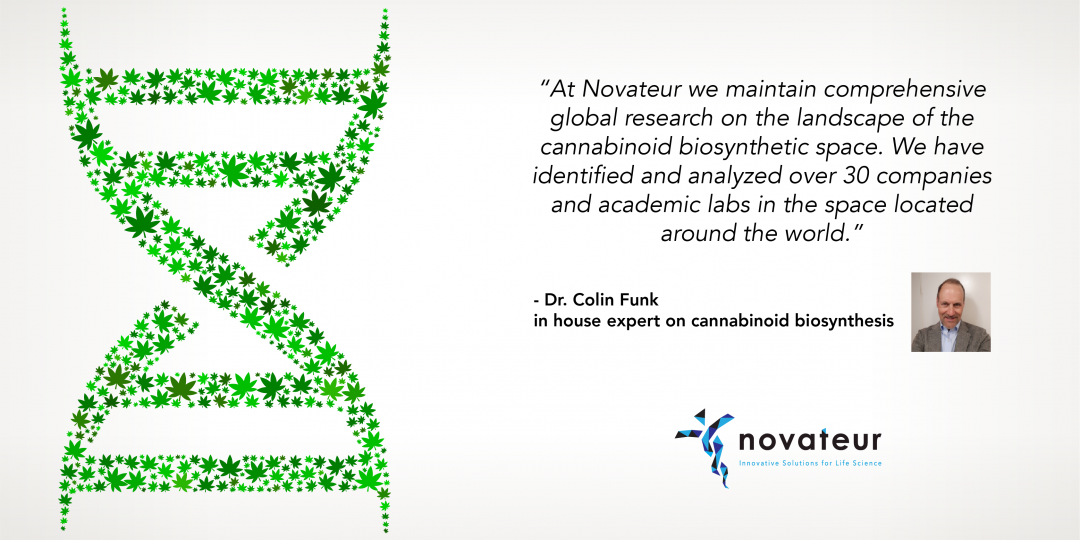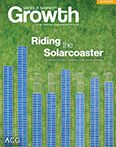Novateur Knows the Cannabinoid Biosynthesis Landscape
Cannabis, medical marijuana, THC, CBD – we hear these terms tossed around just about everywhere – on the street, over social media, in corporate boardrooms, throughout the biotech sector. What’s all the fuss about? The marijuana plant has been exploited for medicinal, agricultural and psychotropic properties for thousands of years but it was only in the mid-1900s that THC (∆9-tetrahydrocannabinol) and CBD (cannabidiol) were isolated and chemically defined in their acid forms as the two major cannabinoids in the Cannabis plant. Since then many additional minor cannabinoids (at least 60) with untapped medical potential have been isolated and characterized. THC and CBD possess clinically validated, beneficial properties and are approved (FDA, Health Canada, etc) for use in some countries (e.g. THC for anorexia and AIDS-associated weight loss, and CBD for two rare genetic forms of epilepsy). With legalization in Canada and at the State level in USA, R&D is ramping up to define further medical benefits of THC, CBD and the minor cannabinoids in many other disorders and in the general wellness market.
The Future is Biosynthesis: Currently, THC and CBD are chemically synthesized or extracted directly from the Cannabis plant. These procedures suffer from drawbacks (see below). They will be supplanted over the next few years by another cost-effective method of preparation – biosynthesis (also known as synthetic biology). Biosynthesis is an enzyme-catalyzed process whereby simple substrates are transformed into more complex products in living microorganisms or cells. Biosynthesis affords the opportunity to revolutionize the industry with highly standardized, pharmaceutical-grade, cheap cannabinoids. In contrast, plant-extracted cannabinoids currently suffer from a number of economic and environmental downsides in production: high costs (≈$4-5000/kg purified product for indoor plant production or ≈$3000/kg outdoor production), the need for large plots of land for plant growth and harvest (outdoor production) or high electricity use (indoor production), significant loss of biomass (only the tiny fraction of flower trichomes is used to isolate product with >90% waste), environmental concerns (use of pesticides/fertilizers/large carbon footprint). While plant-derived cannabinoid use will still be popular with the recreational users, medical-grade cannabinoid formulations derived by biosynthesis will become de rigeur in a few years’ time. A prime example of how biosynthesis supplanted natural source production relates to insulin, now biosynthetically derived by recombinant DNA technology from bacteria instead of extracting from pig cadavers. Biosynthesis allows for uniform production of pharma-grade product, whereas the cannabis industry struggles with batch-batch consistency (purity, contamination with heavy metals and pesticides, mold exposure, yield). And the chemical synthesis business struggles with cost.
“At Novateur we maintain comprehensive global research on the landscape of the cannabinoid biosynthetic space. We have identified and analyzed over 30 companies and academic labs in the space located around the world.”
Dr. Colin Funk
In-house Expert on
Cannabinoid Biosynthesis
At Novateur we maintain comprehensive global research on the landscape of the cannabinoid biosynthetic space. We have identified and analyzed over 30 companies and academic labs in the space located around the world. The companies range from full operation gearing towards scale-up production of cannabinoids, to proof-of-concept start-ups just getting off the ground. We include “companies” with abandoned patents. Our investigation is based on comprehensive review of scientific publications, web articles, “white paper” reports of investment analysts, as well as detailed patent investigations of each company. Our team is actively engaging the premier synthetic biology conferences and gaining first hand soft-intelligence from company CEOs (e.g. SynBio Beta Meeting in San Francisco Oct 1-3, 2019).

In our analysis, Companies are classified according to their main proposed route of synthetic biology: (i) yeast biosynthesis; (ii) bacterial biosynthesis; (iii) microalgae biosynthesis; (iv) “cell-free” biosynthesis (comprising synthetic biochemistry, combinations of synthetic chemistry and biosynthesis; and (v) undeclared or “chassis-agnostic” biosynthesis. We then compare and score the companies believed to be in active development of synthetic biology-derived cannabinoids across six different parameters: (a) potential for product quality (purity); (b) product cost (low); (c) closeness to market; (d) IP positioning and biosynthetic platform/strategy; (e) dollars invested to date to move towards large-scale production; and (f) quality of the scientific team
The cannabinoid biosynthetic space is burgeoning with new players in the field every month. It has the potential to disrupt significantly the current plant-centric industry. The “big players” in this arena (Canopy Growth, Aurora, Tilray, Aphria, etc) will need to make decisions soon in order not to miss the emerging potential of these developing companies. CBD, THC and rare cannabinoids made by biosynthetic routes will disrupt the traditional cannabis industry.
Reach out to Novateur for further information regarding the cannabinoid biosynthetic landscape.



